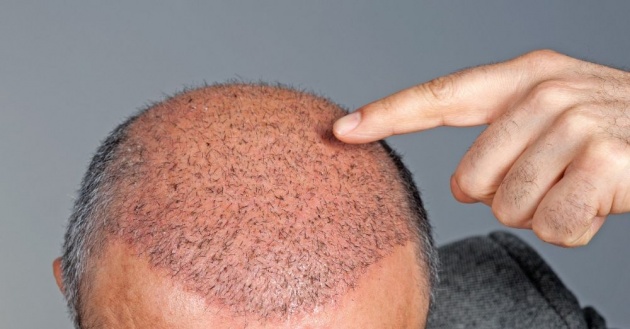
Nearly two out of every three men will begin balding by the time they're 60. Most don't part with their hair willingly—American males collectively spend $1 billion a year trying to hang onto those locks. And with good reason, recent research suggests that women find balding men less attractive then their counterparts who have a thick head of hair, and they may also be turned down for executive positions in their careers. But what really causes hair loss, and is there anything that can be done about it? This natural breakthrough for hair loss may be the answer.
Recent research suggests that the most common type of hair loss, male pattern baldness, can be triggered by faulty hair-making progenitor cells in the scalp. Researchers long believed that men whose hair progressively thins—starting with a receding hairline, and then stretching to the crown—lacked a sufficient number of these cells. Rather, it appears that the cells are merely unable to complete their normal development and mature to a fully-functioning state. That finding, published last month in the Journal of Clinical Investigation, could be the key to reversing hair thinning and baldness. 1
Other potential contributors to hair loss include illness, age, genetics, and even primping habits. Meanwhile, a flurry of myths contribute to men's anxiety, if not to baldness itself. "I get athletes who think helmets caused their hair to fall out, and men who say it's because their mothers rubbed their heads with black tar soap," says dermatologist Gary Hitzig. Neither helmets nor soap are at fault, he says. And more blame may get heaped on mothers than they deserve.
We got to the bottom of 5 common beliefs about hair loss. Here's the bald truth:
Myth: Hair loss is passed down from your mother's side.
Not entirely true. While the primary baldness gene is on the X chromosome, which men get only from their mothers, other factors are also in play. The hereditary factor is slightly more dominant on the woman's side, but research suggests that men who have a bald father are more likely to develop male pattern baldness than those who don't.
Myth: If you're balding, you're old.
On the contrary, hair loss can strike in the teens and is common among 20- and 30-year-olds. The earlier it begins, the more severe it will likely become.
Myth: Wearing a hat strains hair follicles, causing hair to fall out..
Good news for men who rely on caps to cover their shiny crowns: They're not causing any harm. Dirty hats can, however, lead to a scalp infection, which in turn accelerates hair loss, so either make sure yours is clean or rotate frequently.
Myth: Trauma can cause hair loss.
True—with a catch. Physical or emotional stress "will never cause you to lose hair you wouldn't have lost anyway," Hitzig says. "If the hair is not meant to be lost, it will grow back." That said, it can accelerate balding. Rapid shifts in weight—whether pounds are gained or lost—can also contribute to the likelihood of hair loss.
Myth: Treatments like Propecia and Rogaine can prevent hair loss.
True. "Propecia is one of the most important advance in hair loss therapy in the last several decades," says Neil Sadick, a clinical professor in the department of dermatology at the Weill Cornell Medical College. That prescription pill, which reduces levels of a hormone that shrinks hair follicles, works best in younger people whose hair is just beginning to thin. But the drawbacks are huge. As part of a study published in a June 2011 issue of the Journal of Sexual Medicine, Dr. Michael Irwig of George Washington University surveyed 71 regular Propecia users to find that 94 percent suffered low libido, 92 percent experienced erectile dysfunction, and 92 percent had decreased sexual arousal. What's more, the survey showed that some side effects could last an average of 40 months after patients discontinued use of the drug, bucking the commonly held perception that the cure for any unwanted symptom is simply to stop taking the pill.
But Is there anything that can be done to reverse hair loss naturally?
New research shows that there may in fact be a completely natural way to regrow hair almost overnight, and it works for the young and old alike. Click Here To Watch this video to see exactly what you can do to start regrowing your lost hair.



